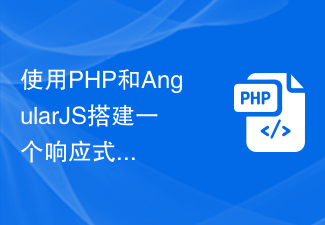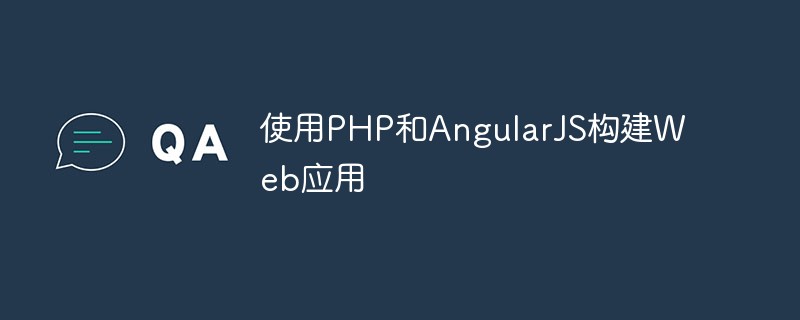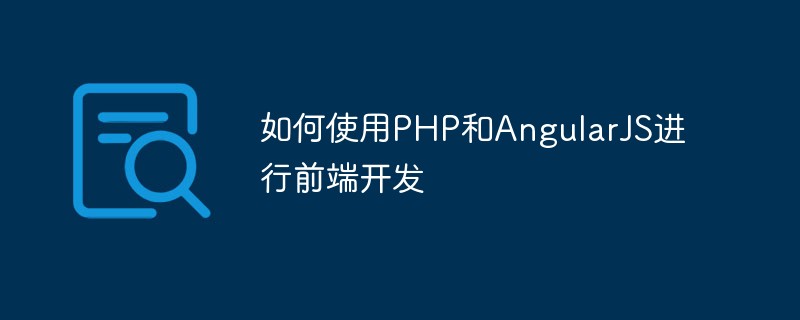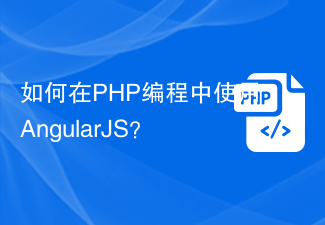AngularJS has become the most popular open source JavaScript framework in the world of web application development. Since its inception, its success has been driven by astounding economic growth and support and adoption from groups – including individual developers, businesses, and communities.
Angular has become a client-side MVW framework (Model-View-Whatever) for building complex single-page applications. It plays an important role in both application testing and application writing while simplifying the development process.
The current version of Angular is 1.3, which is stable and used by Google (the framework maintainer) to support many applications (it is estimated that there are more than 1,600 applications at Google running Angular 1.2 or 1.3). Angular 2.0 was officially announced with the Nigeria conference last October, and the version won't be a complex major update.
Why is Angular 2.0 launched?
Before discussing Angular 2.0 further (estimated release date is late 2015), let us briefly consider the philosophy behind the new version. Angular 2.0 development starts by solving the following problems:
Mobile: The new version will focus on mobile application development. The rationale is that it's easier to handle the desktop side of things, and once the challenges involve mobile (performance, load times), focusing on this aspect will solve the problem.
Modularization: Individual modules will be removed from Angular’s core for better performance. This means you can choose the parts you need.
Modernization: Angular 2.0 will target ES6 and "evergreen" modern browsers (which automatically update to the latest version). This means developers can focus on code relevant to the business domain.
What are the controversies?
There was no mention of a path to migration to version 2.0 at the Nigeria meeting. It also pointed out that jumping to version 2.0 will break the original version 1.3 application and there will be no backward compatibility. Since then the developer community has been rife with uncertainty and speculation, and some developers have begun to question whether it's worth starting a new Angular 1.3 project.
What are the changes?
AtScript
AtScript is a parent set of ES6 and is used to develop Angular 2.0. It is processed by the Traceur compiler (along with ES6) to generate ES5 code and use TypeScript type syntax to generate execution-time assertions, replacing compile-time checks. However, AtScript is not mandatory, and you can still use pure JavaScript/ES5 code instead of AtScript to write Angular applications.
Improve dependency entry (DI)
The basic idea of the dependency injection (Dependency injection) model is that the client class Client does not need to initialize the member variable IServer it depends on by itself, but uses an independent object to create an appropriate implementation class of IServer and assign it to the member variable of the Client. It is particularly beneficial for module development and component isolation. Angular 2.0 will solve this aspect of Angular 1.X. Added missing features such as child injectors and lifetime/scope controls.
Annotations
AtScript provides tools to associate metadata and functionality. This helps in constructing object instances that provide necessary information to the DI library (inspecting relevant metadata when calling a function or creating an instance of a class). It also makes it easy to overload parameter data by providing an annotation.
Child Injectors
A child injector inherits all performance services of its parent class. Depending on the requirements, different types of objects can be called and different scopes automatically covered.
Instance scope
The improved DI library will feature instance scoping, which becomes even more powerful when using Child Injectors and own scope identifiers.
Template and data binding
When developing applications, templates and data binding will go hand in hand.
Dynamic loading
This is a feature missing from the current Angular version, but will appear in Angular 2.0. This will allow developers to add new commands or controllers on the go.
Template
In Angular 2.0, the template compilation process will be asynchronous. Since the code is based on the ES6 module specification, the module loader will load dependencies by simply referencing the component definition.
Commands
There will be three instructions in Angular 2.0:
Component Directives - These will create reusable components via encapsulated logic in JavaScript, HTML, or an optional CSS stylesheet.
Decoration directives - These directives will be used to decorate the element (such as adding a tooltip, or using ng-show/ng-hide to show/hide the element).
Template directives - these will change HTML into reusable templates. The instantiation and embedding of templates into the DOM can be completely controlled by directives. Examples of this include ng-if and ng-repeat.
Routing plan
The initial Angular routing is designed to handle some simple situations. However, as the framework evolves, more and more features are added. Routing is already extensible in Angular 2.0 and will include the following basic features:
Simple json-based routing configuration;
Optional contracts over configuration;
Static. Parameterized routing mode;
URL parser;
Supports query string;
Use push status or Hashchange;
Navigation model (generates a navigation UI);
Document title updated;
404 routing processing;
Location services;
Historical operations.
Now, let’s take a look at the routing features that take Angular 2.0 to new heights:
Subroute
Sub-routing will transform each component of the application into smaller applications by providing them with their own routes, which will help encapsulate the feature set of the entire application.
Screen activation
This will help developers better control the navigation lifecycle through a set of can* callbacks:
canActivate - allow/block navigation to new controllers;
activate - respond to successful navigation to the new controller;
canDeactivate - Allow/block navigation away from old controllers;
deactivate - responds to successful navigation away from the old controller;
These callbacks will allow developers to return a Boolean value or a command (for lower level control).
Design
All this logic is built using a pipeline structure, making it very easy to add your own steps to the pipeline or remove the default stuff. In addition, its asynchronous nature will allow developers to use server requests to authenticate or load data for controllers, although this is still planned.
Log
Angular 2.0 will include a logging service called diary.js - a very useful feature for measuring where your time is spent in your application.
Scope
$scope will be removed from Angular 2.0 and replaced by ES6 classes.
Conclusion
As the release date approaches, the excitement and buzz surrounding Angular 2.0 will intensify. Is breaking change a good thing? We have no way of knowing, but opponents are understandably nervous given the apparent lack of plans to relocate. The excitement came right away. But since it is coming, what we can do is to welcome it actively.
The above content introduces you to the new features of AngularJS 2.0. I hope it will be helpful to you!
 2022年最新5款的angularjs教程从入门到精通Jun 15, 2017 pm 05:50 PM
2022年最新5款的angularjs教程从入门到精通Jun 15, 2017 pm 05:50 PMJavascript 是一个非常有个性的语言. 无论是从代码的组织, 还是代码的编程范式, 还是面向对象理论都独具一格. 而很早就在争论的Javascript 是不是面向对象语言这个问题, 显然已有答案. 但是, 即使 Javascript 叱咤风云二十年, 如果想要看懂 jQuery, Angularjs, 甚至是 React 等流行框架, 观看《黑马云课堂JavaScript 高级框架设计视频教程》就对了。
 使用PHP和AngularJS搭建一个响应式网站,提供优质的用户体验Jun 27, 2023 pm 07:37 PM
使用PHP和AngularJS搭建一个响应式网站,提供优质的用户体验Jun 27, 2023 pm 07:37 PM在如今信息时代,网站已经成为人们获取信息和交流的重要工具。一个响应式的网站能够适应各种设备,为用户提供优质的体验,成为了现代网站开发的热点。本篇文章将介绍如何使用PHP和AngularJS搭建一个响应式网站,从而提供优质的用户体验。PHP介绍PHP是一种开源的服务器端编程语言,非常适用于Web开发。PHP具有很多优点,如易于学习、跨平台、丰富的工具库、开发效
 使用PHP和AngularJS构建Web应用May 27, 2023 pm 08:10 PM
使用PHP和AngularJS构建Web应用May 27, 2023 pm 08:10 PM随着互联网的不断发展,Web应用已成为企业信息化建设的重要组成部分,也是现代化工作的必要手段。为了使Web应用能够便于开发、维护和扩展,开发人员需要选择适合自己开发需求的技术框架和编程语言。PHP和AngularJS是两种非常流行的Web开发技术,它们分别是服务器端和客户端的解决方案,通过结合使用可以大大提高Web应用的开发效率和使用体验。PHP的优势PHP
 使用PHP和AngularJS开发一个在线文件管理平台,方便文件管理Jun 27, 2023 pm 01:34 PM
使用PHP和AngularJS开发一个在线文件管理平台,方便文件管理Jun 27, 2023 pm 01:34 PM随着互联网的普及,越来越多的人在使用网络进行文件传输和共享。然而,由于各种原因,使用传统的FTP等方式进行文件管理无法满足现代用户的需求。因此,建立一个易用、高效、安全的在线文件管理平台已成为了一种趋势。本文介绍的在线文件管理平台,基于PHP和AngularJS,能够方便地进行文件上传、下载、编辑、删除等操作,并且提供了一系列强大的功能,例如文件共享、搜索、
 如何使用PHP和AngularJS进行前端开发May 11, 2023 pm 05:18 PM
如何使用PHP和AngularJS进行前端开发May 11, 2023 pm 05:18 PM随着互联网的普及和发展,前端开发已变得越来越重要。作为前端开发人员,我们需要了解并掌握各种开发工具和技术。其中,PHP和AngularJS是两种非常有用和流行的工具。在本文中,我们将介绍如何使用这两种工具进行前端开发。一、PHP介绍PHP是一种流行的开源服务器端脚本语言,它适用于Web开发,可以在Web服务器和各种操作系统上运行。PHP的优点是简单、快速、便
 如何在PHP编程中使用AngularJS?Jun 12, 2023 am 09:40 AM
如何在PHP编程中使用AngularJS?Jun 12, 2023 am 09:40 AM随着Web应用程序的普及,前端框架AngularJS变得越来越受欢迎。AngularJS是一个由Google开发的JavaScript框架,它可以帮助你构建具有动态Web应用程序功能的Web应用程序。另一方面,对于后端编程,PHP是非常受欢迎的编程语言。如果您正在使用PHP进行服务器端编程,那么结合AngularJS使用PHP将可以为您的网站带来更多的动态效
 使用Flask和AngularJS构建单页Web应用程序Jun 17, 2023 am 08:49 AM
使用Flask和AngularJS构建单页Web应用程序Jun 17, 2023 am 08:49 AM随着Web技术的飞速发展,单页Web应用程序(SinglePageApplication,SPA)已经成为一种越来越流行的Web应用程序模型。相比于传统的多页Web应用程序,SPA的最大优势在于用户感受更加流畅,同时服务器端的计算压力也大幅减少。在本文中,我们将介绍如何使用Flask和AngularJS构建一个简单的SPA。Flask是一款轻量级的Py


Hot AI Tools

Undresser.AI Undress
AI-powered app for creating realistic nude photos

AI Clothes Remover
Online AI tool for removing clothes from photos.

Undress AI Tool
Undress images for free

Clothoff.io
AI clothes remover

AI Hentai Generator
Generate AI Hentai for free.

Hot Article

Hot Tools

Zend Studio 13.0.1
Powerful PHP integrated development environment

Notepad++7.3.1
Easy-to-use and free code editor

Atom editor mac version download
The most popular open source editor

SAP NetWeaver Server Adapter for Eclipse
Integrate Eclipse with SAP NetWeaver application server.

MinGW - Minimalist GNU for Windows
This project is in the process of being migrated to osdn.net/projects/mingw, you can continue to follow us there. MinGW: A native Windows port of the GNU Compiler Collection (GCC), freely distributable import libraries and header files for building native Windows applications; includes extensions to the MSVC runtime to support C99 functionality. All MinGW software can run on 64-bit Windows platforms.







